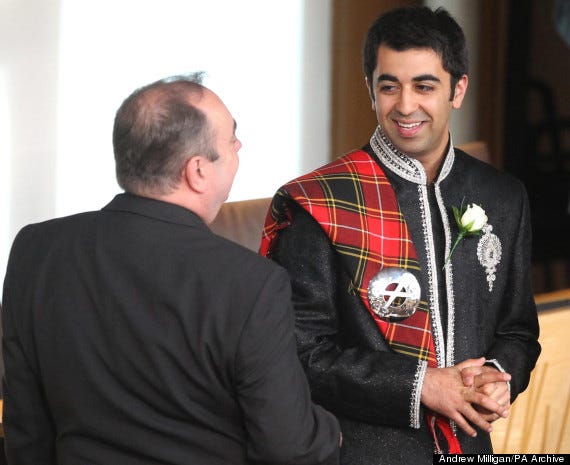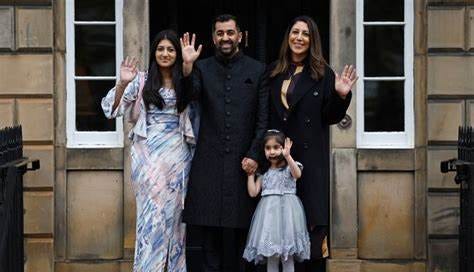13. Civic nationalism: Building inclusive nations (and communities)
How Scotland is taking the inclusive road with civic, not ethnic, identities How Scotland is taking the inclusive road with civic, not ethnic, identities
There are two ‘national’ political parties in the news this week. Here in Scotland, Humza Yousaf was elected leader of the Scottish National Party (SNP) and became first minister of Scotland, leading the devolved Scottish Parliament. In Finland, the Finns Party came a close second in the general election and defeated sitting prime minister Sanna Marin.
On the surface, these events look like two examples of the same thing – ‘nationalist’ parties doing well. However, they are almost completely different in terms of their ‘national’ interests. The Finns Party are, like many such parties in Europe, anti-immigrant and far-right. The SNP, by contrast, are centre-left and very pro-immigrant. This is an example of the difference between ethnic nationalism and civic nationalism.
Isn’t all nationalism ethnically based?
Most – but not all. The Finns Party (or Perussuomalaiset in their native Finnish language) is a good example of an ethnically focused party. Formerly the ‘True Finns’, their policy is that immigration to Finland from outside the EU should be permitted only in cases where it brings economic advantage. Social and health care should be primarily for Finns. Some EU immigrants such as the Roma are "criminals". Refugees should flee to, and remain in, countries neighbouring their own and not come to Finland. In an earlier manifesto, from 2011, the party suggested how demand for labour might be met without immigration; young women should be persuaded not to study and instead give birth to Finnish babies who would eventually fill the demand for workers. (I had to take this from the BBC website; the Finns Party website is almost entirely in Finnish with a single English page which seems not to have been updated since 2019, which is I suppose a logical position for such a party.)
This kind of stance has been on the rise across Europe and indeed elsewhere in the past 20 years or so. There are many other examples; the Sweden Democrats, Fidesz in Hungary, the Freedom Party of Austria, the Danish People’s Party, the list goes on and on. Even in the previously tolerant United Kindgom, parties like the UK Independence Party (UKIP) and now the Reform Party toe this line of ‘natives good, foreigners bad’. One very unfortunate effect of Brexit is that these views have been given legitimacy and even parliamentary support in the UK. Currently the home secretary (interior minister) – herself the daughter of immigrants - is putting all her efforts into stopping migrants in small boats crossing the Channel, even if they have a case for asylum, by immediately deporting them to Rwanda with no return ticket.
Scotland – a different story
Humza Yousaf, the new first minister of Scotland, is the first Muslim to be elected leader of a major UK party and is the first ethnic minority leader of a devolved government in the UK. (Since the late 1990s the ‘devolved nations’ Scotland, Wales and Northern Ireland have their own parliaments or assemblies with differing levels of authority. Before that everything was run from London. Rishi Sunak, the current UK prime minister, is a Hindu and the first ethnic minority head of the UK government.)
Yousaf’s father came to Scotland from Pakistan in 1960 as a child along with his grandparents, who found work at the Singer sewing machine factory in Glasgow. His mother was born in Nairobi, Kenya, in a family with Punjabi roots. (She has talked about experiencing violet racially motivated attacks in Kenya for taking ‘African jobs’ before moving to the UK.) Yousaf himself was born in 1985 in Glasgow, was one of two ethnic-minority students at his school and studied Politics at Glasgow University. He has talked about the 9/11 attacks on the USA in 2001 when he was 16 years old, as being a pivotal moment of awareness of politics and the world changing. He was elected to the Scottish Parliament in 2011 aged just 26, the youngest member at that time, and was sworn in wearing a traditional sherwani robe along with a tartan plaid. He rose through junior ministerial ranks and became cabinet secretary (ie minister) for Justice, then Transport and finally Health. Last week he emerged the winner of the three-way contest to lead the SNP, having been the bookie’s favourite throughout the competition.

You might expect grumblings (or even campaigns) about ‘Is he really Scottish?’. Not a bit of it. Not everyone thinks he was the best choice for first minister, but there is no sense at all (on the public stage at least) that he is anything other than a proud Scot. That’s the difference between ethnic nationalism and civic nationalism.
Civic nationalism – if you’re here, you can be in (if you want)
Civic nationalism is in the liberal tradition of openness and inclusivity. It is built around the idea of ‘shared citizenry’ within the state. Broadly, if you’re here in Scotland, then no matter where you came from and what you’re doing (working, caring, studying, teaching, learning, even just enjoying life) then you are fully entitled to take a Scots identity. This is of course up to the individual – no one is ‘forced’ to be a Scot and many newcomers might choose to be Scottish alongside some other identity. There is, of course, no such thing as formal ‘Scottish citizenship’ – at least for now 😊).
This is part of the SNP’s view on how they work here. All are welcome to be ‘New Scots’. I am struck by how many folk I meet who came from elsewhere are very happy with their Scottish identity. So there are Chinese Scots, Pakistani Scots, Brazilian Scots and even English Scots. (I am one of these, even though I can claim a bit of ethnic Scottishness too through my name and my grandfather.)
This is a very different way of looking at things than ethnic nationalism. Maybe it’s facilitated by the fact that there is no formal citizenry? Maybe it helps that in Scotland resident EU citizens are allowed to vote (unlike in UK elections). At any rate, it makes the Scottish National Party very different from the Finns Party and their ilk. Rather than attempt to convince one half of society to mistrust, sideline and hate the other, here in Scotland we take national poet Robert Burns’ counsel that ‘a man’s a man for ‘aw that’ with its egalitarian position.
One way this inclusive stance plays out in public is seen at the occasions when impromptu demonstrations happen in support of allegedly illegal migrants who are sought by the police. In Glasgow in 2021, a large and noisy gathering forced the authorities to let go their captives when the police van was hemmed in, with the crowd changing ‘refugees are welcome here’. A year later a similar event in Edinburgh led to the same results.
There is no need to choose one identity over the other: you can be proud to be both Pakistani and Scottish.
This doesn’t stop there being unfounded rumours, mainly in the British press, that ‘the SNP hate the English’. This plays into the usual tropes about ethnic nationalism (particularly widespread in England). English nationalism (as opposed to British) has a troubled past and difficult present. Can you find the odd ranting Scotsman who hates the English? Probably, if you look hard enough. Is this official state policy? Not at all. The SNP are understandably not keen on being told what to do by people hundreds of miles away to whom other interests are paramount. (This is not the same as EU membership, where all member states get a place at the top table in decision making.)
Conclusions
There are lessons here for humanity and organisation. Be open, encourage participation and invite involvement. Note that a Scots identity is not forced on people, it’s there for them to choose. I have said much about this stance in my work on Host Leadership.
As always, please help me by liking and sharing this piece, and leave a comment or question. Thank you!
Dates and mates
My good friend Chris Corrigan has an online class coming up with his colleague Caitlin Frost. Working With Complexity Inside And Out is an opportunity to come and learn an eclectic and effective approach to leadership and personal development. They say:
“These tools are useful for anyone working with complexity and uncertainty, at all levels of organization or community life. Whether you have a formal leadership role in a system or you show up to help others, there will be something in this for you.”
It runs 13th April – 15th June 2023. Highly recommended – there will be lots of great material to engage with and also great hosting to build learning groups and community. Check out more details at https://www.harvestmoonconsultants.com/complexity-inside-out.html.







Civic nationalism – if you’re here, you can be in (if you want)
What a wonderful invitation to a collective and mobilizing movement and a possibility to keep focus on positive power instead of fear. This is something that I would like to see more of here in Sweden as well.